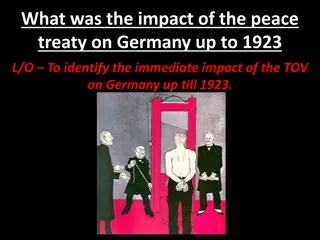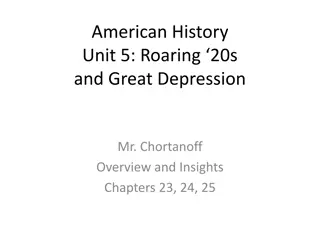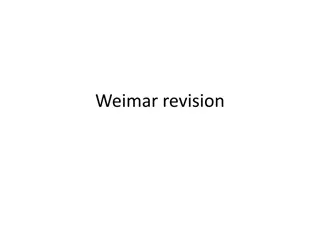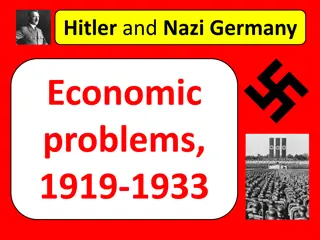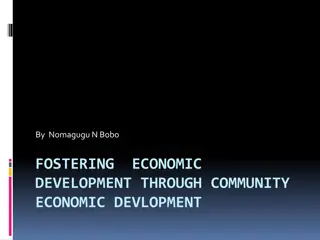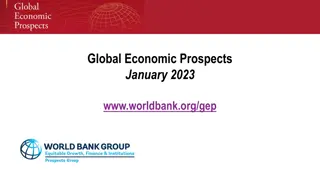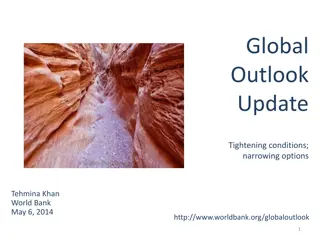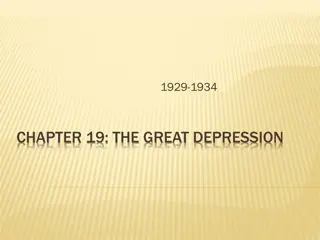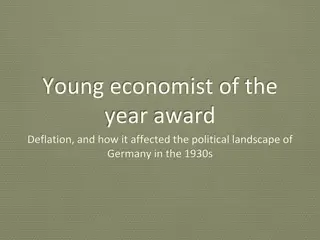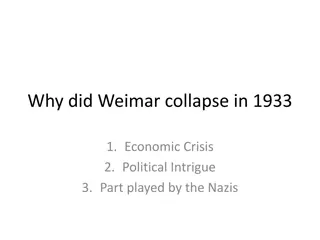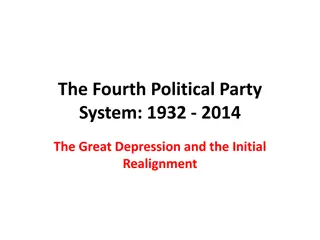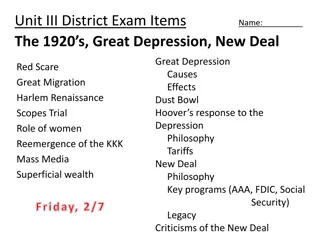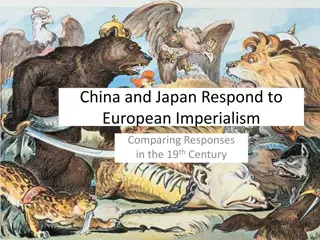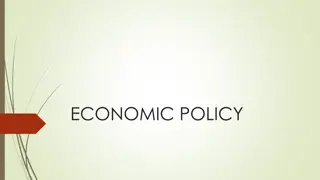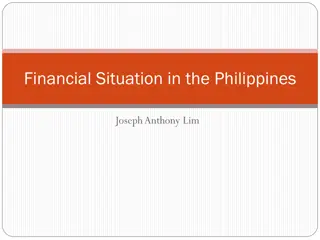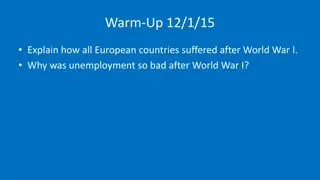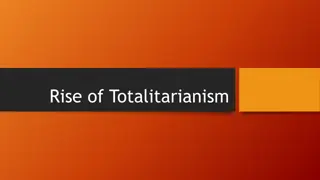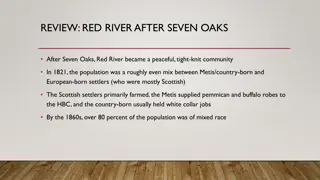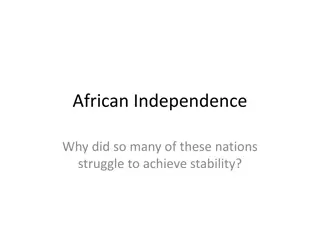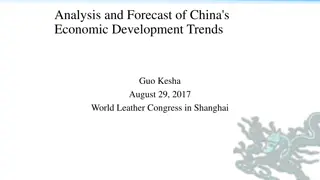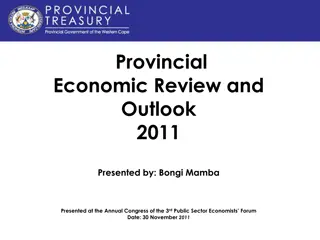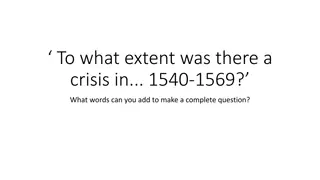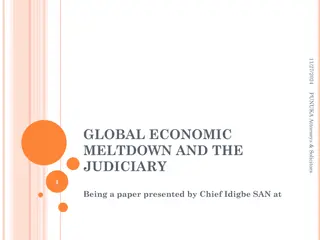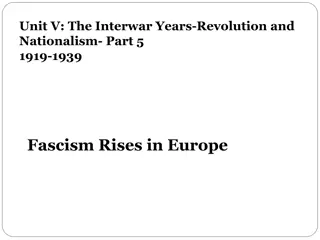2023/24 Annual Performance Plan Presentation for Small Business Development Department
The presentation outlines the 2023/24 Annual Performance Plan of the Department of Small Business Development, covering situational analysis, global economic outlook, performance priorities, game-changers program, alignment with economic recovery plans, institutional program performance, key risks a
27 views • 59 slides
Witch Hunts in East Anglia: Causes and Motives Behind the Witch Hunt Led by Hopkins and Stearne
Witch hunts in East Anglia between 1645 and 1647 were influenced by a combination of economic and political factors. The disastrous agricultural conditions of the mid-1640s, high taxation, poverty, and political turmoil contributed to the witch hysteria. Accusations were primarily driven by tensions
3 views • 17 slides
Unrest and Uncertainty: Post-Election Turmoil in Pakistan
The recent national elections in Pakistan have sparked controversy and unrest, with former prime ministers Imran Khan and Nawaz Sharif both claiming victory amidst allegations of voter fraud and political restrictions. The country faces economic challenges, internal insurgencies, and strained intern
8 views • 5 slides
Impact of Treaty of Versailles on Germany up to 1923
Germany faced immediate harsh consequences from the Treaty of Versailles, including huge reparations, loss of resource-rich lands, and political turmoil. The treaty led to economic bankruptcy, hyperinflation, and social unrest, with right-wing extremists attempting coups and assassinations. The occu
1 views • 8 slides
American History Unit 5: Roaring 20s and Great Depression Overview
The Roaring 1920s brought economic prosperity, cultural changes, and political developments. The Great Depression followed, leading to desperation and significant reforms. Explore the impact of key events and personalities such as President Hoover and FDR, the Age of Jazz and Popular Culture, and th
0 views • 12 slides
Understanding the Challenges Faced by the Weimar Republic
This compilation of sources delves into the various problems encountered by the Weimar Republic, such as food shortages, political uprisings, economic instability, and currency devaluation. It discusses the threats from both the Left and the Right, shedding light on the turmoil and crises faced by t
0 views • 23 slides
Understanding Key Concepts in Economic Geography
Economic Geography is a sub-discipline that utilizes a geographical approach to analyze the spatial distribution of economic activities at various scales. It focuses on the location of economic activities and their relationship with the environment, encompassing primary, secondary, and tertiary sect
1 views • 20 slides
Economic Crises Faced by Weimar Republic, 1919-1933
The Weimar Republic encountered significant economic challenges between 1919 and 1933, leading to chaos and a surge in extremist support. Major crises included hyperinflation in 1923 and the devastating global Depression starting in 1929. The Treaty of Versailles imposed reparations on Germany, whic
0 views • 24 slides
Fostering Economic Development Through Community Economic Development
Community Economic Development (CED) involves local actions to create economic opportunities improving social conditions, especially for the disadvantaged. It recognizes the interdependence of economic, environmental, and social challenges, emphasizing solutions rooted in local knowledge. The ultima
1 views • 30 slides
Global Economic Prospects January 2023 Overview
The January 2023 Global Economic Prospects report by the World Bank covers topics like Global Outlook, Regional Outlooks, Investment Growth After the Pandemic, and challenges faced by Small States. It includes growth forecasts, changes in growth forecasts for 2023, risks such as persistent inflation
0 views • 14 slides
Causes of the Great Depression: Economic Turmoil and Bank Failures
The Great Depression was characterized by an extraordinary reversal from prosperity to misery in the American economy. Factors such as a sharp decline in demand for goods, bank failures, and the Federal Reserve System's actions contributed to the crisis. The failure to prevent bank failures and the
0 views • 19 slides
Global Economic Update: High-income Economies Accelerating, Developing Countries Facing Challenges
The global economic outlook presents a contrast between high-income economies accelerating in growth while developing countries encounter challenges due to headwinds and capacity constraints. Key messages highlight the need for structural reforms to enhance outcomes. Risks include fallout from the s
4 views • 34 slides
The Great Depression: Stock Market Crash and Economic Turmoil of 1929-1934
In the early 1930s, the United States faced a severe economic downturn known as the Great Depression. Triggered by the stock market crash of 1929, the nation experienced widespread financial devastation, with millions of people losing their jobs, homes, and savings. The period was marked by economic
0 views • 32 slides
Economic Crisis and Political Turmoil in 1930s Germany
Deflation and the Great Depression had a profound impact on Germany in the 1930s, leading to widespread unemployment, economic turmoil, and political unrest. The Weimar Republic faced severe challenges as the Nazi party gained power amidst the economic crisis, exacerbated by the aftermath of World W
0 views • 16 slides
Factors Leading to the Collapse of the Weimar Republic in 1933
Economic crisis, political intrigue, and the rise of the Nazis were key factors in the collapse of the Weimar Republic in 1933. The Wall Street Crash of 1929 exacerbated Germany's economic problems, leading to massive unemployment and social unrest. Political errors and the erosion of democracy furt
0 views • 15 slides
Influence of Great Depression on John Steinbeck's Grapes of Wrath
John Steinbeck's personal experience during the Great Depression and Dust Bowl migration strongly influenced his portrayal in The Grapes of Wrath, capturing the human dignity and struggles faced by those affected. The novel depicts the conflict between the powerful and powerless, showcasing themes o
1 views • 7 slides
Enhancing Economic Statistics in Asia-Pacific Region
The Regional Programme on Economic Statistics aims to improve economic statistics in the Asia-Pacific region by enhancing capacity and coordination among National Statistical Offices (NSOs) and other stakeholders. The programme focuses on implementing the Core Set of Economic Statistics to facilitat
0 views • 11 slides
The Fourth Political Party System: 1932-2014 - The Great Depression and Economic Realignment
The Fourth Political Party System in the US, spanning from 1932 to 2014, was significantly influenced by the Great Depression. Factors like the boom in road construction, the housing industry, and the stock market bubble led to economic turmoil. Key figures like Herbert Hoover expressed optimism bef
0 views • 14 slides
The Great Depression: Causes, Impact, and Government Response
The 1930s marked a period of economic turmoil known as the Great Depression. Misleading prosperity, overspeculation in the stock market, and flawed government policies all contributed to the devastating crash of 1929. As the economy collapsed, unemployment soared, businesses failed, and a sense of d
0 views • 20 slides
Democratisation and De-democratisation: The Weimar Republic, Austria, and Inter-war Czechoslovakia
The period between the World Wars saw the birth of new states like the Weimar Republic, Austria, and Czechoslovakia, each facing unique challenges. From the aftermath of WWI to the Treaty of Versailles and economic crises, these states navigated political extremism, hyperinflation, and territorial c
0 views • 35 slides
Overview of 1920s: Great Depression, New Deal, and Social Changes
Explore the significant events and themes of the 1920s, including the impact of the Great Depression, the New Deal policies, social movements such as the Harlem Renaissance and the Red Scare, and key figures like Hoover and FDR. Learn about the causes and effects of the era's economic turmoil, cultu
0 views • 6 slides
The Opium War and Its Impact on China: Political, Economic, and Social Perspectives
The Opium War was a significant historical event that led to the signing of the Treaty of Nanjing in 1842 between China and Great Britain. This treaty marked the beginning of unequal treaties and extraterritoriality in China. The war stemmed from the British East India Company's opium trade, which l
0 views • 12 slides
Overview of Economic Policy: From Mercantilism to Present-Day Practices
Explore the concept of economic policy and its importance in achieving economic objectives. Delve into the historical debate on state intervention in the economy and major schools of economic theory like Mercantilism. Understand the emergence of economic policies through economic, political, scienti
0 views • 105 slides
Somerset's Governance and Foreign Policy in Edward VI's Reign
Edward VI's reign under Somerset saw significant changes in governance, marked by Somerset's ambitious moves to consolidate power and promote his supporters. However, factional rivalries and poor decision-making led to internal turmoil. Somerset's foreign policy aimed to assert England's claim over
0 views • 12 slides
John Donne: A Journey Through Metaphysical Poetry and Personal Turmoil
John Donne, a prominent figure in Metaphysical Poetry, was born into a Roman Catholic family at a time of religious turmoil in England. Despite facing personal tragedies, struggles with faith, and financial difficulties, Donne's poetry reflected his deep emotions and complex thoughts. His life was m
0 views • 26 slides
Events Leading to WWII: Treaty of Versailles to Japan's Invasion of Manchuria
Events like the Treaty of Versailles, Great Inflation in Germany, the October 1929 Depression, and Japan's invasion of Manchuria were significant precursors to World War II. The flawed Treaty of Versailles, economic turmoil in Germany, global depression, and territorial ambitions of Japan all contri
0 views • 25 slides
Economic Resilience and Growth in the Philippines: A Success Story of Overcoming Financial Challenges
The Philippines faced economic turmoil with capital outflows, currency depreciation, and stock market crashes during crises, but rebounded with robust recovery and investment upgrades. Fiscal improvements, governance reforms, and investor confidence contributed to the country's emergence as a favore
1 views • 14 slides
The Impact of World War I on European Countries and Global Unemployment
European countries faced significant challenges after World War I, with war debts, high unemployment rates, and economic instability. The worldwide depression further worsened the situation, leading to inflation and a weakened industry. This turmoil gave rise to social unrest and nationalism, highli
1 views • 6 slides
Political Turmoil in 1980s India
The political landscape in 1980s India was marked by significant events such as the rise of communal tensions in Kashmir, the emergence of Sikh separatism in Punjab, and the assassination of Prime Minister Indira Gandhi. These events led to a period of turmoil, including Operation Blue Star and anti
0 views • 15 slides
Understanding the Great Depression: Causes, Impact, and Legacy
The Great Depression was a devastating period in American history, marked by widespread unemployment and economic turmoil. Learn about its origins, the reasons behind its name, and how it impacted the nation until its end in 1939. Explore key details such as the stock market crash, failed banks, and
0 views • 6 slides
Impact of Banking Crises on the Real Economy: Lessons from History
Understanding the influence of banking crises on the real economy, particularly during the Great Depression, where massive bank suspensions triggered economic turmoil. The interplay between banking panics, monetary deflation, bank failures, loss of credit information, and debt deflation worsened the
0 views • 55 slides
The Rise of Totalitarianism: Impact of the Great Depression and Hitler's Ascension
Explore the causes of the Great Depression, the impact of the Treaty of Versailles on Italy and Germany, and analyze how Adolf Hitler came to power in Germany amidst the economic turmoil. Dive into the rise of Fascism in Europe, including Nazism, Mein Kampf, and Hitler's strategies for economic reco
0 views • 27 slides
Turbulent Times in Red River: A Historical Overview
Red River transitioned from a peaceful community to a land of tension as new settlers, primarily Protestant, arrived in the 1860s. Led by figures like John Christian Schultz, these settlers discriminated against the Metis and sought control over the settlement, leading to increased conflict as crop
0 views • 9 slides
Challenges Faced by African Nations in Achieving Stability Post-Independence
Many African nations faced struggles in achieving stability post-independence due to a variety of reasons such as historical colonial legacies, economic challenges, leadership issues, and external interference. Despite efforts like the Pan-African Movement and participation in World War II, the path
0 views • 20 slides
Analysis and Forecast of China's Economic Development Trends - Guo Kesha Presentation
The presentation by Guo Kesha at the World Leather Congress in Shanghai delves into the analysis and forecast of China's economic development trends. It discusses whether a new cycle has opened for the Chinese economy, the potential for an L-type growth platform, and initial research on economic tre
0 views • 22 slides
Economic Review and Outlook 2011: Global Trends and Regional Impacts
The Provincial Economic Review and Outlook for 2011 highlighted the global economic performance and outlook, focusing on factors like GDP growth, employment trends, and socio-economic conditions in the Western Cape region. It discussed the recovery in global economic growth post-2009, with the IMF p
0 views • 29 slides
Mid-Tudor Crisis: A Comprehensive Overview
The period from 1540 to 1569 marked a tumultuous time in Tudor history, characterized by political instability, economic challenges, religious turmoil, and societal shifts. Key questions surrounding the crisis include the extent of royal authority restoration, governance effectiveness, foreign relat
0 views • 28 slides
The Impact of the Great Depression on the 1932 Election
The election of 1932 was heavily influenced by the Great Depression, with high unemployment and economic turmoil shaping the candidates' platforms. Franklin D. Roosevelt's victory marked a shift towards a more active role for the federal government in addressing economic and social challenges, as op
0 views • 7 slides
Global Economic Meltdown and the Role of the Judiciary - A Critical Analysis
Chief Idigbe SAN presents a paper on the global economic meltdown and its impact on the judiciary, focusing on causes, effects, and solutions. The paper delves into the subprime mortgage crisis in the United States, deregulated banking sectors, and the responsibilities of judicial officers. It addre
0 views • 16 slides
The Rise of Fascism in Europe During the Interwar Years
Post-World War I, Europe faced economic turmoil leading to the rise of fascism, particularly in Italy under Mussolini. Fascism, a nationalist ideology, promoted authoritarian rule, suppression of opposition, and militaristic foreign policies. This extreme system attracted support due to promises of
0 views • 54 slides



